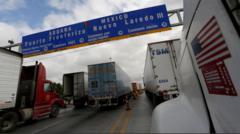Recent Canadian police action reveals significant insights into local drug production methods, potentially influenced by international cartels, highlighting the urgent need for comprehensive strategies in combating the opioid crisis.
Major Drug Lab in British Columbia Uncovered: A Regional and Global Perspective

Major Drug Lab in British Columbia Uncovered: A Regional and Global Perspective
Authorities dismantle Canada's largest drug lab, emphasizing the implications for local crime and international drug trafficking networks.
In a significant law enforcement action, Canadian authorities announced the dismantling of what is being termed the largest drug laboratory in the country, located in a remote area of British Columbia. This operation yielded a staggering amount of chemicals and materials capable of generating approximately 96 million doses of fentanyl, a substance primarily responsible for an alarming number of overdose fatalities across Canada.
The raid also marked a critical moment in Canada’s drug enforcement history as it uncovered a method of drug production typically associated with Mexican drug cartels. This method employs a specific precursor chemical and is predominantly utilized to mass-produce a particularly potent synthetic variant of methamphetamine known as “super meth.” This raises multiple concerns: it may indicate either that Canadian drug operations are adopting cartel techniques or that there are potential connections to Mexican criminal organizations operating within Canadian borders.
Officials, while recognizing the significance of this breakthrough, have provided limited details about any possible cartel connections. David Teboul, an assistant commissioner with the Royal Canadian Mounted Police (RCMP), noted, "Our enforcement actions have dealt a decisive blow to transnational organized crime," signaling intent to combat organized drug trafficking both nationally and internationally.
However, despite the scale of the operation, law enforcement has so far charged only one individual, leading critics to question the effectiveness and thoroughness of the ongoing investigation. This situation provides a poignant glimpse into Canada’s role in the global drug trade, particularly in relation to the authorities’ heightened focus on intercepting illegally imported chemical precursors, predominantly sourced from China.
Experts underline the urgency for a comprehensive strategy that encompasses both local enforcement and international cooperation, particularly as challenges related to opioid trafficking and production methodologies evolve rapidly. As this investigation continues, the implications of this operation for Canada’s drug policies and international relations remain a topic of critical discussion.
The raid also marked a critical moment in Canada’s drug enforcement history as it uncovered a method of drug production typically associated with Mexican drug cartels. This method employs a specific precursor chemical and is predominantly utilized to mass-produce a particularly potent synthetic variant of methamphetamine known as “super meth.” This raises multiple concerns: it may indicate either that Canadian drug operations are adopting cartel techniques or that there are potential connections to Mexican criminal organizations operating within Canadian borders.
Officials, while recognizing the significance of this breakthrough, have provided limited details about any possible cartel connections. David Teboul, an assistant commissioner with the Royal Canadian Mounted Police (RCMP), noted, "Our enforcement actions have dealt a decisive blow to transnational organized crime," signaling intent to combat organized drug trafficking both nationally and internationally.
However, despite the scale of the operation, law enforcement has so far charged only one individual, leading critics to question the effectiveness and thoroughness of the ongoing investigation. This situation provides a poignant glimpse into Canada’s role in the global drug trade, particularly in relation to the authorities’ heightened focus on intercepting illegally imported chemical precursors, predominantly sourced from China.
Experts underline the urgency for a comprehensive strategy that encompasses both local enforcement and international cooperation, particularly as challenges related to opioid trafficking and production methodologies evolve rapidly. As this investigation continues, the implications of this operation for Canada’s drug policies and international relations remain a topic of critical discussion.



















